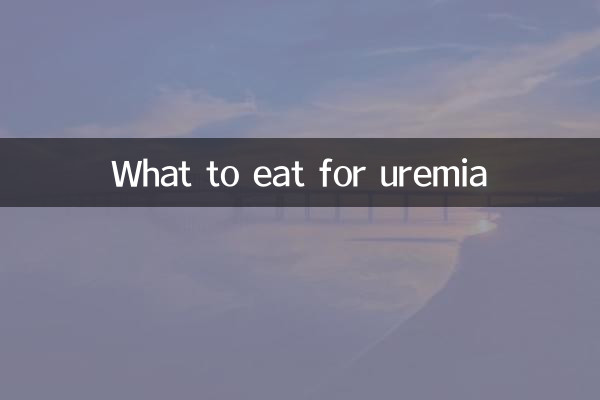What to eat for uremia: scientific dietary guidelines combined with hot topics
Recently, dietary management of uremia patients has become a hot topic in the health field. As the incidence of chronic kidney disease increases, how to delay the progression of the disease and improve the quality of life through scientific diet has attracted much attention. This article will combine the hot discussions on the Internet in the past 10 days to provide structured dietary suggestions for uremia patients.
1. Core principles of uremic diet

According to the latest medical guidelines and nutritional research, patients with uremia need to follow the "three lows and one control" principle:
| principles | Specific content | recommended daily amount |
|---|---|---|
| low protein | Mainly high-quality protein (eggs, fish, lean meat) | 0.6-0.8g/kg body weight |
| Low phosphorus | Avoid processed foods, offal | 800-1000mg |
| Low potassium | Limit intake of high-potassium fruits and vegetables | 2000-3000mg |
| water control | Adjust according to urine output | Urine volume +500ml |
2. Recommendations for recent hot food ingredients
According to the popularity of discussions on social media and health platforms, the following ingredients have received widespread attention recently:
| Food Category | Recommended ingredients | Things to note | heat index |
|---|---|---|---|
| High quality protein | Egg white, cod | Avoid egg yolks (high in phosphorus) | ★★★★☆ |
| low potassium vegetables | cucumber, cabbage | Boil water to remove potassium | ★★★☆☆ |
| staple food substitution | Wheat starch products | Need to supplement essential amino acids | ★★★☆☆ |
| Seasoning options | Onion, ginger, lemon juice | Replace high-sodium seasonings | ★★★★☆ |
3. Phased diet suggestions
According to the renal function stage and recent expert consensus, the dietary priorities are different at different stages:
| disease stage | GFR range (ml/min) | Protein recommendations | caloric requirement |
|---|---|---|---|
| Issue 3 | 30-59 | 0.8g/kg | 35kcal/kg |
| Issue 4 | 15-29 | 0.6g/kg | Same as above |
| Stage 5 (without dialysis) | <15 | 0.6g/kg | Same as above |
| dialysis patients | - | 1.2g/kg | Same as above |
4. Analysis of controversial topics
Recently, there has been a lot of discussion about "whether vegetarian therapy is effective for uremia". Research shows:
1. A pure vegetarian diet may lead to a deficiency of essential amino acids, so supplementation needs to be done with caution
2. Plant protein has a low phosphorus absorption rate, but generally has a high potassium content.
3. Currently, mainstream recommendations still recommend high-quality animal protein.
5. Sample recipes for a week
| Meals | Monday | wednesday | Friday |
|---|---|---|---|
| breakfast | Wheat starch cake + egg white | Low protein bread + apple | Lotus root paste + cabbage |
| lunch | Steamed fish + rice | Shredded chicken + vermicelli | Shrimp+Winter Melon |
| dinner | Egg drop soup + steamed buns | Fried cucumber + rice porridge | Steamed pumpkin + noodles |
6. Special reminder
1. Individual differences are large, and blood phosphorus, blood potassium and other indicators need to be monitored regularly.
2. The recently discussed "superfoods" such as chia seeds may contain too much phosphorus for patients with uremia.
3. Recommended cooking methods: steam, boil, stew, avoid frying
4. The latest research suggests that vitamin D supplementation should be carried out under the guidance of a doctor
Scientific diet is an important part of comprehensive treatment of uremia. This article combines recent hot topics and evidence-based medical evidence, hoping to provide practical reference for patients. It is recommended to consult a nutritionist regularly to develop a personalized plan.

check the details

check the details